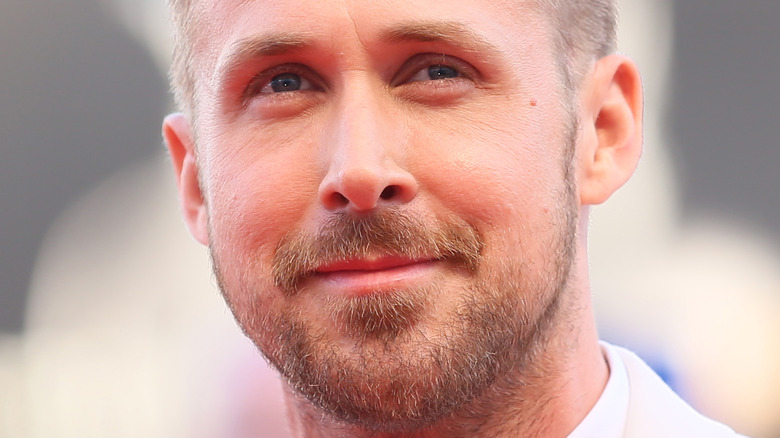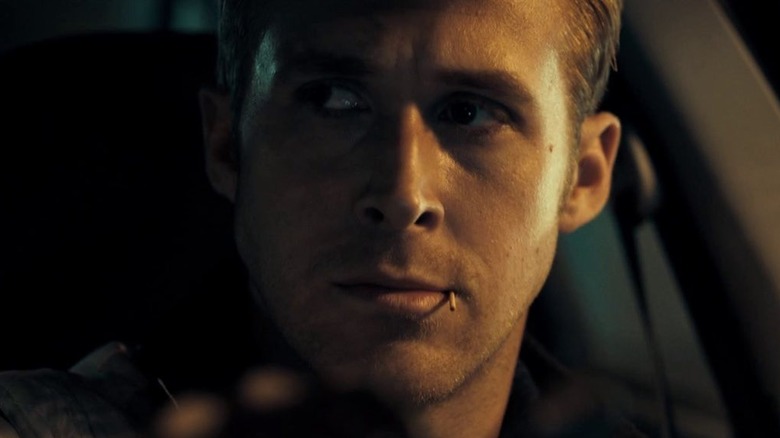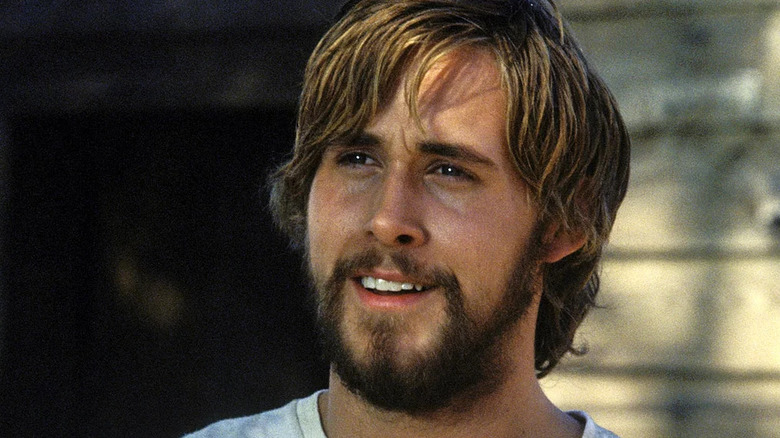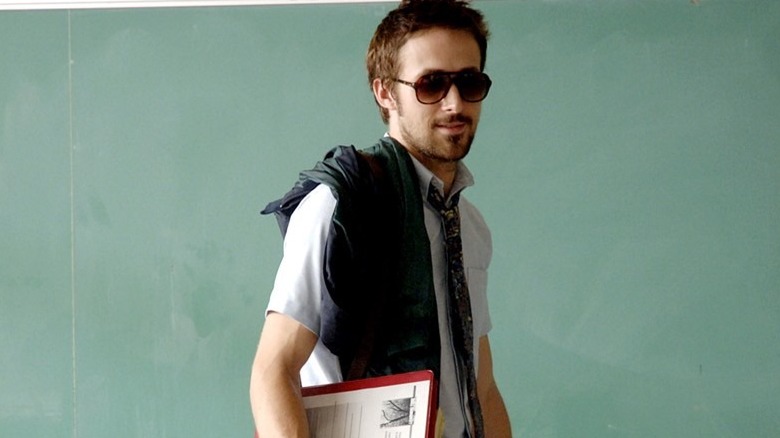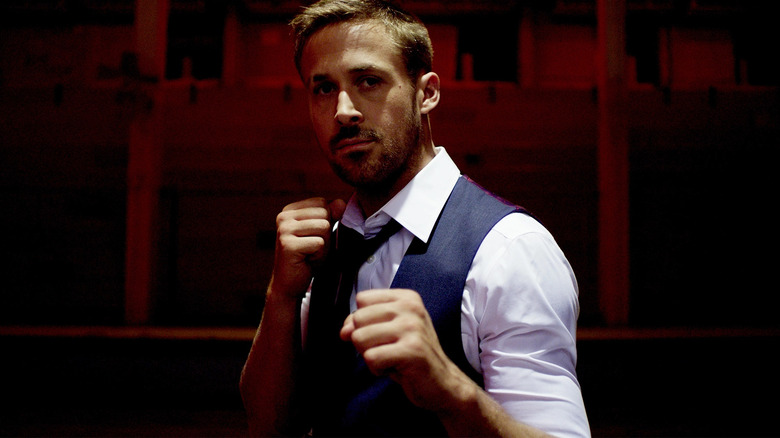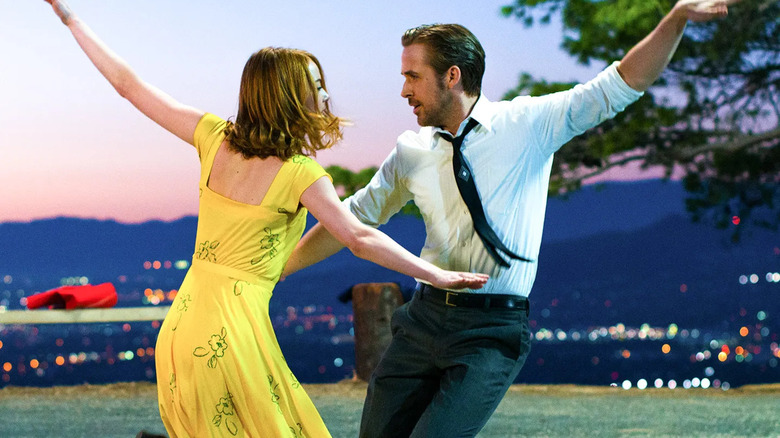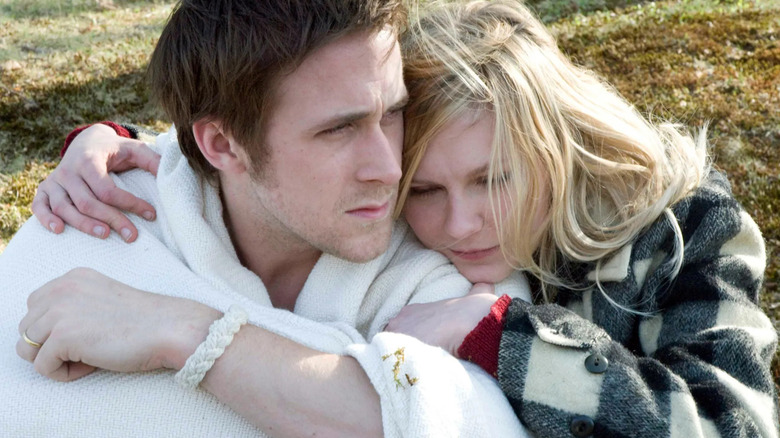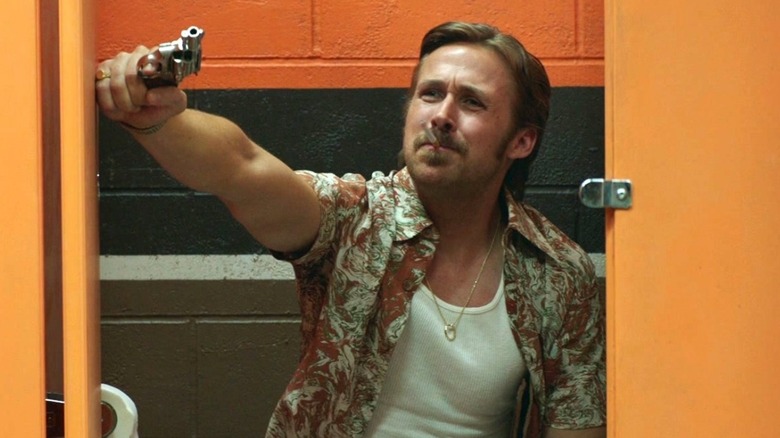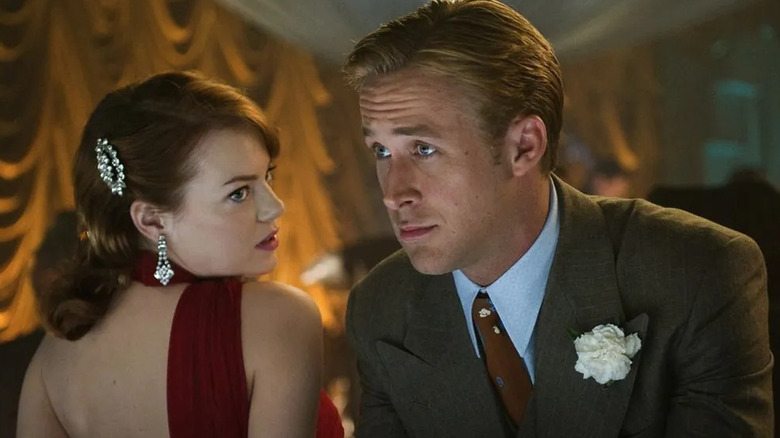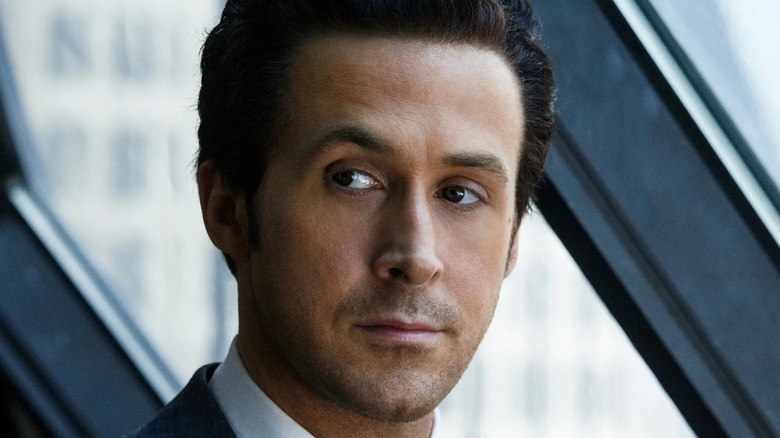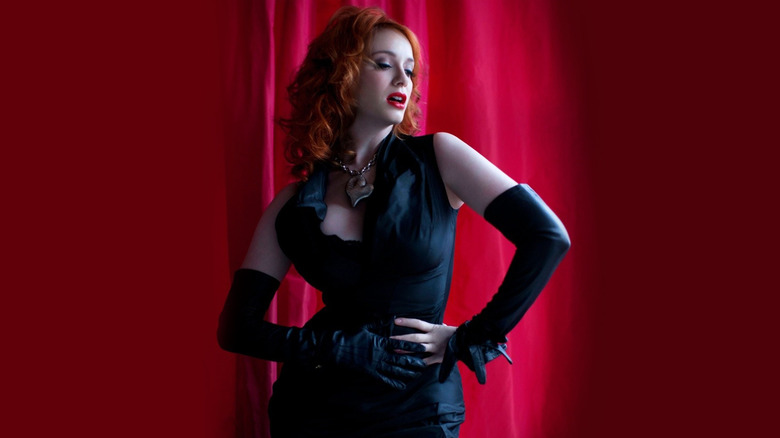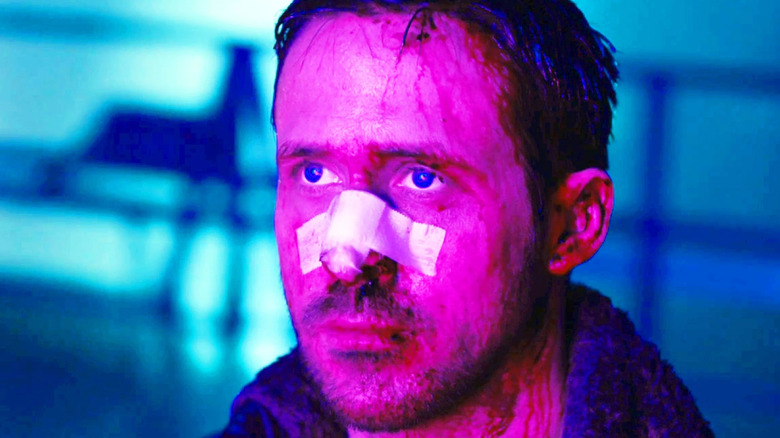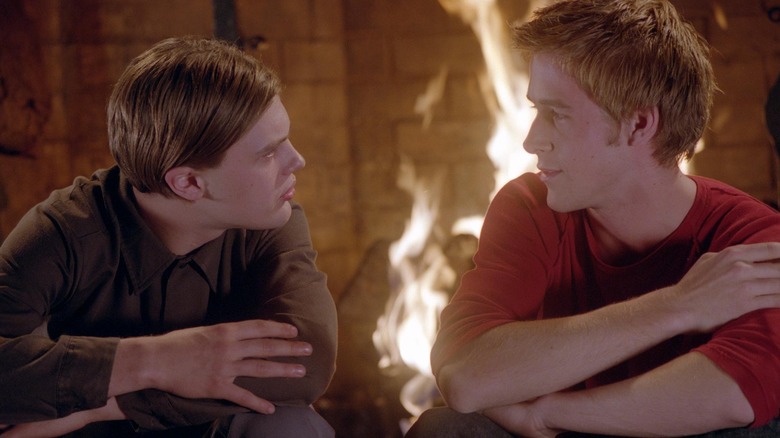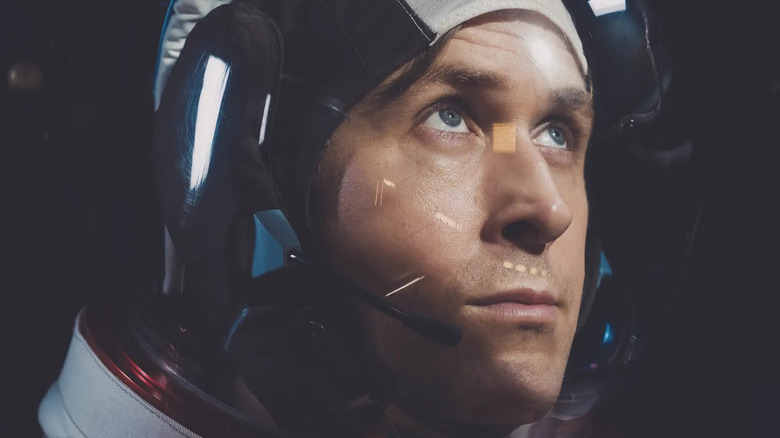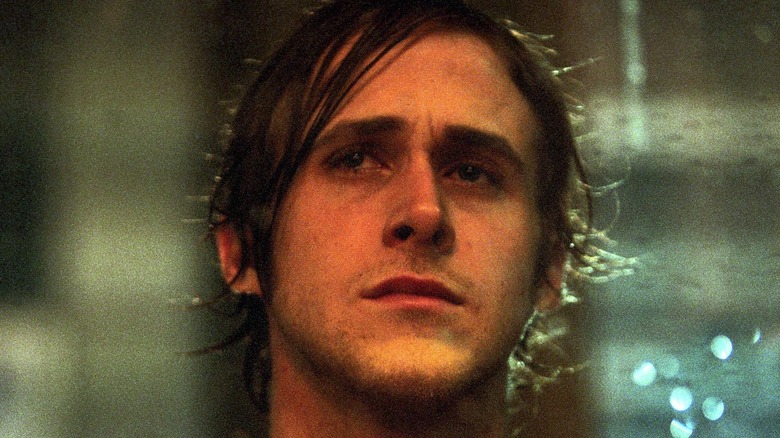Ryan Gosling's 7 Best And 7 Worst Movies Ranked
There simply isn't anyone like Ryan Gosling, the Canadian actor who somehow managed to transform himself from Mouseketeer to action star, indie darling, and ultimate yardstick for handsomeness – he was, after all, director Greta Gerwig's first choice for Ken in "Barbie." There are any number of leading men in Hollywood who can boast one such feat, and a few who can boast two, but that perfect pyramid of critical, commercial, and physical appeal is sacred ground, and that's where "The Gray Man" himself resides full-time.
In his decades-long career in cinema, Gosling has racked up an impressive number of memorable performances in beloved movies, both in big-budget properties – hopefully, soon to include his role of choice in the MCU – and smaller, more introspective stories. But even Gosling, with all his skill and success, has attached himself to some relative stinkers in his day. Despite all the worship he received, Gosling is still a human, and with that humanity comes failure alongside success. Digging into his filmography, it's clear that there's a marked difference between his best and worst work, and in an effort to suss out which is which, here are Ryan Gosling's seven best and seven worst movies ranked.
Best: Drive
This list begins as expected with Gosling's highest-rated movie on Rotten Tomatoes, but surprisingly, also one of his most polarizing films to date: the quiet, violent, idiosyncratic fable that is 2011's "Drive." Maintaining a 93% score with critics, it's clear that the film is considered a quality piece of cinema, but the experimental genre-smashing piece by director and longtime Gosling collaborator Nicolas Winding Refn is not without its detractors.
For many who caught a brief glimpse of a trailer or a summary of its plot, the actual cinematic experience of "Drive" was uncomfortably surprising. Unlike so many expectations, the movie wasn't a by-the-book action movie with car chases and oil-slick streets – for most of its runtime, it is anything but. "Drive" is the action film version of meditation. The score is simple and sparse, the production (though sleek) is minimal, and Gosling and Refn removed as much dialogue from the script before shooting as they could.
There is little doubt that "Drive" is outstanding in its field, but if you go in looking for the standard crop, you'll be disappointed. Instead, expect the "Drive" that Gosling and Refn intended: a modern-day fable that flips the concepts of the knight, the damsel, the dragon – and toxic masculinity – on its head.
Worst: The Notebook
We couldn't follow up on Gosling's most polarizing movie without discussing what could also be Gosling's most polarizing movie, "The Notebook." But whereas "Drive" dazzled critics and divided fans by toying with its genre, "The Notebook" failed to impress critics and won over most viewers by being as typical of its genre as humanly possible. For many, "The Notebook" is the de facto romance movie – a position it mainly only jockeys for alongside the other works by its original author, Nicholas Sparks.
Like other movies based on Sparks's novels, "The Notebook" pairs one gorgeous but inoffensive male lead, Gosling, with an equally gorgeous and inoffensive female lead, Rachel McAdams, and sets them as star-crossed lovers, circling each other until some divine act such as a rainstorm or missing piece of mail finally unites them. The movie certainly isn't bad – McAdams certainly shines as bright as the script will allow her – but it's as formulaic and uninspired as they come, and not nearly the type of nuanced, contemplative role that Gosling fans have come to expect. As Noah Calhoun, Gosling is just another cloned male romance actor, meant to demonstrate how uptight and un-fun his female costar's other potential mate is – sorry, James Marsden.
Best: Half Nelson
It's easy to speculate that Gosling learned a lesson from "The Notebook," or at least became better in touch with his own taste, as he followed the cookie-cutter saga with an almost unbroken string of indie darlings and stellar performances. The clear standout among them is "Half Nelson," not just because it earned Gosling his first nomination for Best Actor at the Academy Awards, but because he gave the film his all, and every piece of production gave it right back.
The "Half Nelson" script is an achievement in storytelling if for no other reason than how little it preaches, judges, or tries to sell any ham-handed contrasting examples. Its characters are all deeply flawed, especially Gosling's Dan Dunne, a drug-addicted teacher who reveals himself to be a loser in every sense of the word. But "Half Nelson" doesn't judge Dunne, instead revealing the social context that makes those mistakes, while not at all endearing, at least explainable.
He's an excellent teacher serving an underprivileged community, but he also smokes crack during school hours. He cares for his students, especially the troubled young Drey, more than any of his peers, but at the same time, breaks almost every moral and ethical standard in his role as a teacher. In the end, "Half Nelson" is an unbiased, unpretentious character study, and Gosling realized the script's full potential.
Worst: Only God Forgives
Every bad movie is a tragedy, but the real tragedies are the ones that come out bad when they showed every sign of being great. Such is the case of "Only God Forgives," Gosling and Refn's follow-up to "Drive" that promised to recapture the film's silent, atmospheric tension; sudden, arresting streaks of violence; and vivid, neon cinematography. And while technically all those ingredients are in the mix by the end of "Only God Forgives," something in its preparation and cooking just spoiled the broth for critics and fans alike.
One possible explanation for the sour taste it left in viewers' mouths is that a few of the key spices that made "Drive" so compelling were wildly overindulged. Gosling's character in "Drive," known only as the Driver, was unusually laconic and it made him seem simple, nonjudgemental, and humble. Gosling's character in "Only God Forgives," Julian, is so quiet and brooding that he comes across in every scene as either a Gosling-shaped cardboard cutout or a surly meathead. Likewise, the way in which "Drive" sprinkled its ultra-violence among long scenes of merciful tranquility is overwrought in "Only God Forgives," and so whether violence is scattered among peace or peace is scattered among violence ends up debatable.
Best: La La Land
If you're starting to pick up on a trend among Gosling's movies, it's that an unusually high fraction of them end up divisive in the eyes of critics and audiences. The trend continues with "La La Land," a critical darling that nonetheless ended up a centerpiece of one of the Oscars' biggest controversies,when it won and then unwon Best Picture within one live minute on stage – and therefore a major talking point of the #OscarsSoWhite movement. The divisiveness doesn't end there, as the movie also featured in the larger conversation of race and Hollywood due to criticism of Gosling's character and his perceived status as a 'white savior of jazz.'
Regardless of all its controversy, "La La Land" still has a lot to offer anyone who watches it. It's worth a viewing based solely on the fact that it paired Gosling alongside frequent costar Emma Stone, as the pair's chemistry has always been as plain as day – if ever in doubt, seek out "Crazy Stupid Love," unfortunately knocked off of this list by the sheer volume of Gosling's hits. Above all, "La La Land" is charming through and through – it's bright, colorful, joyous, and just plain fun.
Worst: All Good Things
It's difficult to pinpoint exactly what caused "All Good Things," the 2010 mystery starring Gosling and Kirsten Dunst, to flounder so spectacularly. Audiences and critics agree on its paltriness and the cold, hard numbers more than prove them right – against a $20 million budget, the movie grossed less than $2 million at the global box office.
Perhaps the most frustrating part of the film's failure is that it is based on an actual story, that of (finally) convicted murderer Robert Durst, which is packed with an unusually large volume of true-crime drama. On top of that, Gosling and Dunst actually performed great throughout the story, but it seems like the rest of the production just couldn't keep up.
There isn't much to say about the rest of the film, which intentionally goes nowhere with its tiptoeing ending, but it did accomplish something almost entirely unique: due to Durst's enjoyment of the film, he volunteered to finally open up about his role in the events that inspired it. While on break from being interviewed for the docuseries "The Jinx," a hot mic captured Durst's confession, which finally led to his conviction for the murder of Susan Berman.
Best: The Nice Guys
Like "Only God Forgives," "The Nice Guys" was conceived with everything it needed to be a success – in this case, a script and direction by the amazing Shane Black, and a buddy-cop pairing between Gosling and Russell Crowe. But unlike "Only God Forgives," this time, the pieces all fell into place, and "The Nice Guys" is a total delight. In a number of ways, the film is a spiritual sequel to another movie written and directed by Black, "Kiss Kiss Bang Bang," with both movies following an unconventional pairing of variably qualified sleuths as they try to solve a young girl's disappearance amid a Hollywood coverup.
Luckily, "The Nice Guys" manages to capture almost every bit of magic from its two antecedents, putting Gosling and Crowe through an old-fashioned detective plot whose humor and quirkiness are anything but. Throughout his filmography, Gosling has been given far too few chances to display his comedic chops, but "The Nice Guys" gives him the chance of a lifetime, and he rises to the occasion admirably.
Worst: Gangster Squad
There is one word that springs to mind when watching the 2013 period thriller "Gangster Squad": trite. In fact, the word forces itself into viewers' minds almost every time any of its characters open their mouths. Almost every bit of dialogue is so cliché, you would swear you had heard it before.
The characters are the same, all neatly fitting into their default places in the mob movie toolkit. Even the pairing of Gosling and Stone aren't immune – their chemistry can't save them from the constant stream of tired old chestnuts they're stuck reciting. Though Josh Brolin is well-cast as the take-no-prisoners cop and Sean Penn brings his typical elan to the role of ruthless gangster Mickey Cohen, neither are given nearly enough to work with, and so they're at their best when they're just screaming and shooting people.
The plot doesn't fare any better, either. Fast talking cops battle vicious mobsters and citywide corruption, prompting them to fight fire with fire. It's a tale as old as time, and "Gangster Squad" fails to add anything new to the telling. If there's anything surprising in the movie, it's its odd moments of brutal violence, and the surprise isn't very fun.
Best: The Big Short
Though "The Big Short" isn't perfect – it's filled with overly-complicated jargon and heavy-handed satire – it is nonetheless an excellent film. Its cast is exceptionally star-studded, with Gosling co-starring alongside Christian Bale, Steve Carell, and Brad Pitt (alongside a number of memorable cameos), and every one of them acts with obvious joy. Adam McKay's writing and directing also flex his muscles throughout, with dozens of surprising moments cropping up that make the experience uniquely oddball.
What could have been the film's undoing, its mishmash of different tones and genres, actually contributes to its charm. The average scene somehow contains comedy, drama, commentary, directorial flair, and real character work, which is not a badge many other movies could proudly wear. Gosling is no small contributor to the range and quality, handling his duel roles of salesman and narrator as deftly as ever.
Not only is it entertaining and worthwhile on its own merit, it's also the film that allowed McKay to branch out from comedies (superb though they were), into dramatic territory. Without "The Big Short," we would likely have never received "Vice" and "Don't Look Up" in their current quality, and that alone makes us thankful.
Worst: Lost River
The 2014 fantasy drama "Lost River" is unique among this list's movies in that it doesn't star Gosling at all. Instead, it marks his feature debut as a writer/director. Unfortunately, all of Gosling's experience as a dramatic actor didn't follow him to his new role, and "Lost River" failed to impress much of anyone.
It's clear from watching "Lost River" that Gosling knows film – his shot-calling is great and his attention to symbolism and context is everywhere – but the story that supports all that visual prowess doesn't deserve it. The vast majority of the film is either standard and boring, or fantastical for the sake of being fantastical. Gosling clearly intended to prop the film up based on memorable moments, unique little what-ifs, like using the head of a T-rex statue as a weapon, but seemingly forgot to pair those moments with interesting characters and an engaging plot. Instead, he clearly took all of the worst lessons he learned from his collaborations with Refn, all of them ultimately circling the idea of style over substance, and leaned on them hard.
Best: Blade Runner 2049
There are few taller orders in the history of cinema than creating a sequel to "Blade Runner," quite possibly the best sci-fi film ever, 35 years after its release. Anyone who tried would have to be either incredibly crazy or incredibly confident. Luckily, director Denis Villeneuve has demonstrated a surplus of both in his career, and that's why he volunteered to direct "Blade Runner 2049" and why he knocked it out of the park.
The original film eventually came to garner almost universal praised for its score (by the incomparable Vangelis), cinematography, production design, atmosphere, and thought-provoking themes. Against all odds, "Blade Runner 2049" managed to earn the same. The movie is gorgeous, deep, fun, and Gosling is even able to excel in his role as a stoic bounty hunter (and no spoilers: like the original, he's either a replicant or not).
Although the ability of the film to match the original's quality in a few ways is impressive, what is even more impressive is the one major aspect that it majorly improved: its romance. Unlike the original romance between Deckard and Rachael, which was strained, passionless, and at times even toxic, the pairing of Gosling's K and Ana de Armas's Joi is crackling with chemistry and carries a throughline of genuine empathy and selflessness throughout the otherwise dark story.
Worst: Murder by Numbers
Gosling is decidedly not to blame for how lackluster and disappointing "Murder by Numbers" ended up. He and Michael Pitt, who plays his partner in crime in the film, perform admirably. Their twosome of smart, scheming, increasingly unhinged teenage murderers are compelling throughout, and the way in which their relationship – equal parts friends, enemies, conspirators, and loaded with sexual tension – develops throughout the story makes the two actors responsible for many of the film's best moments. Unfortunately, "Murder by Numbers" has little else to offer.
Sandra Bullock's charm comes through and makes her pugnacious detective protagonist likable, but that character has almost nothing to do, nor anywhere to go. She mainly glides along the conveyor belt of the movie's standard detective-bad guy plot. A few affairs and gruff retorts are meant to make her seem complex and interesting, but she never quite takes off or carries her scenes.
Gosling and Pitt, therefore, are left carrying the movie's weight, a feat unmanageable by even the best in their position. If the film had focused less on its bare-bones plot and commonplace detective, and instead given Gosling and Pitt the movie's central focus, "Murder by Numbers" could have been great.
Best: First Man
From a distance, the 2018 Gosling vehicle "First Man" could reasonably be assumed to be one of many different films. From its trailers, genre, and basic premise, the film looked as if it could be a biopic, a space adventure, a historical reenactment, puffy piece of United States patriotism, or even a bleak criticism of masculine obsession. In reality, "First Man" ended up being all of those at times and still kept itself coherent, meaningful, and enjoyable. Its success with fans, reviewers, and the box office demonstrate its ability to deliver, no matter what it ended up as.
Like the film's variable nature, its highlights are all over the place in terms of tone and effect. One of the biggest highlights is Claire Foy's performance as Janet Armstrong, the wife of Gosling's Neil Armstrong. Another is its space sequences, especially those involving launch and landing. You'll likely never see so much shaky-cam use in your life, but if you can successfully keep your nausea in check, it makes the mission's risks and tensions visceral and palpable. And then again, another highlight is how utterly slow the film allows itself to be, barely inching its plot or characters forward for minutes at a time, so it's not an easy film to praise concisely.
Worst: Stay
According to Rotten Tomatoes scores, the 2005 thriller "Stay" is the worst movie ever to feature Gosling. At an abysmal 27% approval rating with critics, "Stay" appears almost universally detested. Its box office performance was similarly awful, grossing less than $9 million against a $50 million budget, which would seem to suggest that audiences felt the same. Oddly enough, however, its user score is almost three time higher at 70%. So why such a massive disparity? Ultimately, the answer likely lies in the fact that director Marc Foster didn't want the film to be easy, explainable, logical, or even based in reality – and for many fans of surrealist cinema, that approach is just fine.
In interviews with MTV, Foster, Gosling, and fellow star Naomi Watts made it clear that what was for sale with "Stay" was not a plot with a surprise twist that ties everything together. As Gosling said of the film, "This has nothing to do with reality, and this is a trip, and we're all going to take it together." For fans of the type of head-scratchers and sequiturs common to the films of directors like David Lynch, the experiment that Foster, Gosling, and company took with "Stay" is a welcome one. For those looking for more obvious, immediate entertainment, "Stay" is not the Gosling movie for you.
